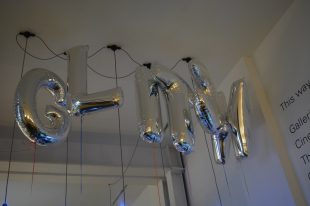
The last week in March was a busy one for the Seeing Things group, as we made four trips to the CCA to see what was on offer at the GLITCH Film Festival, organised by Digital Desperados. This is the second year the festival has run (the first was in 2015). GLITCH is an exciting, unique, and radical festival, which focuses specifically on film and art produced by or about queer/LGBTQIA+ people of colour. A festival celebrating and promoting this kind of work by minority groups was obviously right up our street, and when we discovered that many of the films were F-rated – meaning that they represent women both on screen and behind the camera – we couldn’t resist! (I may have actually squealed with excitement.)
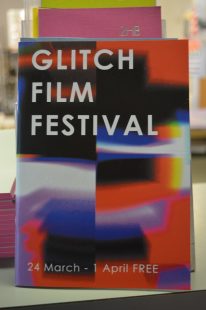
Ailsa and I originally picked out nine films to go to, before realising that this might be too big an undertaking. After that, we whittled it down to our four favourites:
- Check It, directed by Dana Flor & Toby Oppenheimer
- Southwest of Salem: The Story of the San Antonio Four, directed by Deborah S Esquenazi
- Kiki, directed by Sara Jordenö
- Ovarian Psycos, directed by Joanna Sokolowski & Kate Trumbull-LaValle
Myself and Joyce were the die-hards who attended all four films (!), while Ailsa, Linda, Liz, Mary Alice, and Sara joined us at various points over the week.
Although we didn’t realise it when we were choosing the films, there was a common thread running through them all: finding comfort, safety, and a supportive community among people with shared experiences. All of them were documentaries, and the group appreciated the chance to get to see a bit about the lives of people we might never otherwise encounter.
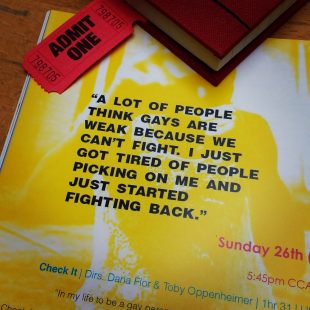
Check It tells the story of black LGBT teenagers in Washington, DC, who form a gang to fight back against people who have abused them. These young people experience a lot of violence and hardship, but the film allows us to see how powerful they become as a result of their friendships and the support they find in the gang. Linda commented that the film was “alien, conflicting, and (at times) depressing”, but was relieved to see a happy ending. There were certainly some very bleak moments in the film, and we were all shocked to see how hard the lives of the Check It members were, in an area only a few miles away from the White House; a couple of us commented on how jarring it was to consider the differences between President Trump – a white, heterosexual millionaire – and the people featured in the documentary – LGBT people of colour, often from backgrounds of poverty. Joyce felt the film made her reflect on life from a different perspective. This was something we could all relate to, and came up time and time again as we saw more films.
Southwest of Salem: The Story of the San Antonio Four was the darkest of the films we saw. It tells the story of four Latina lesbians who were falsely convicted of child sexual abuse by a sexist, racist jury. The documentary presents to us their stories after 10 years in prison, and describes their struggle to be freed. The four women returned to court in late 2016 to hear the outcome of their fight to have their conviction overturned, but only one of our group had followed the case, so the film was full of suspense for the rest of us! It was difficult to watch: Joyce found the film to be very intense, while I found myself crying more than once out of sadness, anger, and frustration. Similarly, Linda said the whole film was an “emotional ride”, and was shocked by much of what she saw. Mary Alice too was angered by aspects of the women’s story, while Sara noted how well the documentary was made, and how important it is that stories like this are told, even if they upset or anger us.
One particular line from Jeff Blackburn, a lawyer fighting for the San Antonio Four who was featured in the film, really stuck with me:
If people only knew how little truth and justice had to do with the way the legal system works, they’d probably amass at courthouses with lighted torches.
These words were so disheartening, and show how important it is for us to be aware of the structures around us and how they operate, often failing the most vulnerable among us.

About half an hour after Southwest of Salem ended, the group filed back into the theatre to see Kiki, a much more light-hearted documentary about the contemporary ballroom scene in New York City. The documentary shows us the lives a group of young LGBTQ people of colour who are members of this Kiki Scene, which provides a safe space and a sense of community for people who are otherwise marginalised. One of the great things about this film was that the filmmaker, Sara Jordenö, co-wrote it with a leading member of the scene, Twiggy Pucci Garçon; that the story was being told by one of the group members made it more engaging, and really gave the audience a true sense of what the Kiki Scene is about. Ailsa really enjoyed the film, saying she found it inspirational and sassy. Seeing the stories of these young peoples’ lives made her re-evaluate the way she went about her life, and made her feel more motivated. Similarly, Joyce found Kiki inspirational and self-empowering, and loved the groovy music!
The last film we saw was Ovarian Psycos. This is a documentary about the Ovas, a group of women of colour who cycle around East LA, challenging violence against women, poverty, racism, and colonialism. These women carry with them at all times ‘feminist ideals with indigena understanding and an urban/hood mentality’ (from their website). There were a couple of special treats in store for us at this event: the first was that before the film, we were shown the short documentary Nothing About Us Without Us, directed by Dorett Jones, a filmmaker and Development and Training Manager at Imkaan. Imkaan is a black feminist organisation which works to fight against violence against women and girls. The film – which features Jones’s own footage – shows a protest by women of colour in the UK against cuts to women’s services. Secondly, Jones herself, along with Xela de la X, the founder of the Ovas, were present at the screenings to participate in a Q&A with the audience!
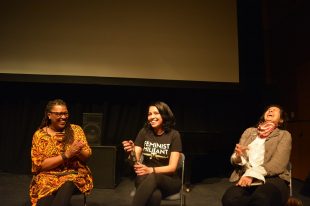
It was fantastic to see the positive changes being a member of the Ovas brought to the lives of the women in the documentary. In the film, Xela observes that there were some services available to her as an at-risk youth, but asks what is being done to help adults who are struggling, or vulnerable to addiction or violence:
…now an adult, I’m still an at-risk adult. So where are the spaces for us?
As well as challenging structures of oppression, the Ovas provide these invaluable safe spaces to help at-risk women. Ailsa felt enlightened by the film, although like me, felt a bit uncomfortable during both the film and the Q&A afterwards: both Xela and Jones talked about the racism they’ve experienced throughout their lives, and as white women in the audience, we couldn’t help but be aware of our own privilege and how we may unwittingly contribute to racist structures in society. We both felt, however, that this was important: our discomfort showed that we were learning from Xela and Jones, and spurred us on to make changes in our communities. Joyce described the film as feel-good and empowering, and was inspired to look at her own community and the positive changes that can be made there. The same was true of Nothing About Us Without Us: seeing women demand the services they deserve made me want to fight to change the systems that make women suffer. Although it made me angry to see the negative impact on Black and Minority Ethnic women of government budget cuts, it made me want to get out there and do something about it. Liz really enjoyed how Ovarian Psycos showed us different people’s stories, giving us a more detailed view of the lives of the Ovas and how they interact with the group and the world they live in.
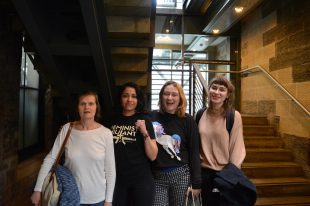
All the films really got the group thinking about the changes we can make in our own lives to help ourselves and the people around us. We saw how people fight to overcome their struggles, with varying degrees of success. Seeing the realities of people’s lives presented in this way helped us all understand the world from different perspectives. The immense value of safe spaces for people with common experiences was really highlighted, as we saw how the lives of the people represented on screen were challenging in ways that our group had never considered. As Linda suggested, the films had our emotions flying all over the place, but the stories we heard and the lessons we learned made it absolutely worth it.
We’re looking forward to the next GLITCH festival in 2019!
If you would like to join us on upcoming trips, we would love to hear from you. Drop us an email, call us on 0141 550 2267 or pop in to see us at 23 Landressy Street.

Comments are closed.